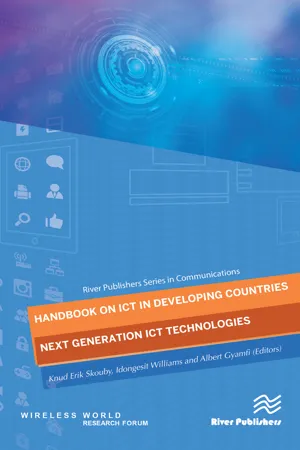
Handbook on ICT in Developing Countries
Next Generation ICT Technologies
- 225 pages
- English
- ePUB (mobile friendly)
- Available on iOS & Android
Handbook on ICT in Developing Countries
Next Generation ICT Technologies
About this book
Handbook on ICT in Developing Countries: Next Generation ICT Technologies is the second volume of the Handbook of ICT in Developing Countries. The first volume was on the potential implementation and service delivery of the forth-coming 5G networks. Here the focus is on the new technologies and services enabled by 5G networks or broadband Internet networks including artificial Intelligence (AI), machine learning, augmented reality, Internet of Things (IoT), autonomous driving, blockchain solutions, cloud solutions etc. Some of these are already globally experiencing growth in the existing networks and all of them are expected to grow substantially in the future.
Examples: currently, 5% of global organizations have fully adopted AI, but the penetration is expected to increase rapidly before 2025. IoT with 20.35 billion devices connected in 2017 is estimated to show 75.44 billion devices connected in 2025. The expected growth is based on delivering of new value to businesses and citizens.
It is, however, not obvious that this growth will also occur in developing countries. Currently, the digital divide between developing countries and developed countries is widening. This is mostly due to the lack of infrastructure and low level of awareness by the businesses and citizens of the value made possible by the new technologies for developing countries.
The book discusses the potentials of the new technologies for developing countries and the need for market interventions that will facilitate the demand and supply side of the market. It is designed for a broad audience including practitioners, researchers, academics, policy makers and industry players and influencers. The language and approach to the handbook is a combination of the academic writing style and professional reviews.
Tools to learn more effectively

Saving Books

Keyword Search

Annotating Text

Listen to it instead
Information
Table of contents
- Cover Page
- Half Title
- Series Page
- Title Page
- Copyright Page
- Table of Contents
- Foreword
- Preface
- List of Contributors
- List of Figures
- List of Tables
- List of Abbreviations
- Prospects and Challenges of Next Generation ICT Technologies in Developing Countries
- 1 A Regulatory Taxonomy for Cloud Services in Latin America
- 2 Lessons from Brazil’s National Computer Policy for a New Industrial Policy on Industry 4.0
- 3 What Developing Countries Can Learn From The EU’s GDPR
- 4 Utility Cooperatives as Rural NGT Providers: Feasibility, Potentials and Pitfalls
- 5 Blockchain, Trust and Elections: A Proof of Concept for the Ghanaian National Elections
- 6 Hybrid Cloud Adoption in a Developing Economy: An Architectural Overview
- 7 Developing Use Cases for Big Data Analytics: Data Integration with Social Media Metrics
- 8 Intrusion Detection and Prevention System for Wireless Sensor Network Using Machine Learning: A Comprehensive Survey and Discussion
- 9 Comprehensive Threat Analysis and Activity Modelling of Physical Layer Attacks in Internet of Things
- 10 An Extension of the Information Systems Success Model; A Study of District Health Information Management System (DHIMS II) in Ghana
- 11 Reviewer Paper Assignment Problem – A Brief Review
- Index
- About the Authors
- About the Editors
Frequently asked questions
- Essential is ideal for learners and professionals who enjoy exploring a wide range of subjects. Access the Essential Library with 800,000+ trusted titles and best-sellers across business, personal growth, and the humanities. Includes unlimited reading time and Standard Read Aloud voice.
- Complete: Perfect for advanced learners and researchers needing full, unrestricted access. Unlock 1.4M+ books across hundreds of subjects, including academic and specialized titles. The Complete Plan also includes advanced features like Premium Read Aloud and Research Assistant.
Please note we cannot support devices running on iOS 13 and Android 7 or earlier. Learn more about using the app